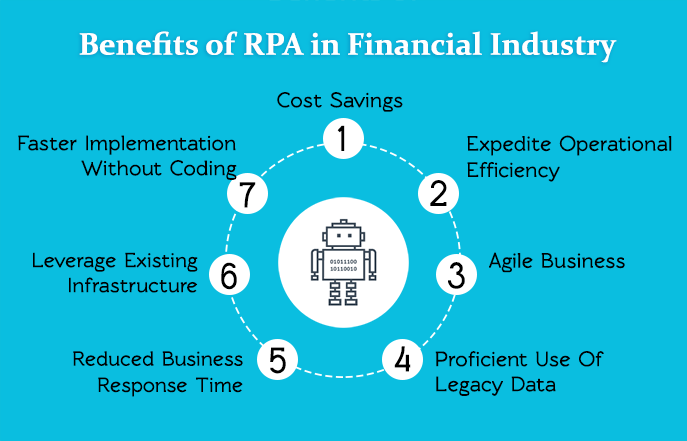
Know how Financial service providers can transform their core operations using RPA Innovation
To compete in an undeniably saturated financial industry, where the virtual operation adoption is increasing, financial companies need to stay focused on their end goal. Expectations at customer end could be hassle-free operations, accessibility, faster responsive, a value from financial products/services, altogether a delighted client experience. Expectations at firms end could be improved efficiency, a better understanding of clientele, maintenance of privacy and security and low costs.
Robotic Process Automation is the ultimate solution to exceed the expectations at both customer and financial institutions' end. Click To TweetMajor banks such as Axis Bank and Deutsche Bank have implemented RPA to automate certain business processes. RPA rapidly reduces costs, time and staff required for various processes, in which tedious and rule-based tasks are carried out by programmed “bots“, with reduced human intervention. Hence, efficiency, accuracy and business operations of the industry observe a substantial shift.
Financial service providers manage huge customer data and there is a possibility of human error. By adopting RPA, they can lessen manual processing and time consumption, maintain accuracy. Software bots have the ability to perform rule-based logical tasks with human intelligence. They can bring down the processing time up to 40% and costs up to 80%, automating certain processes can help staff in engaging with higher value tasks to shift the operational efficiency.
Let’s look into a few areas of financial institutes, where RPA can be implemented.
Every financial services company deals with numerous queries regarding products/services. RPA can be implemented here, reducing the turnaround time and creating an improved customer responsive system. Chatbots resolve the queries in real time, using AI for decision making and NLP to process natural language. With the help of NLP, Chabot can understand the natural language to communicate with customer at ease, replacing staff.

Financial institutions, contributing to the economy, has to abide by compliance. RPA has the ability to fetch and compose data from multiple channels can improve the efficiency of the companies compliance program, saving it from risks. It can also be available 24/7 and can streamline processes like data collection, compilation sorting information and risk reporting.

Accounts payable is a simple yet repetitive process in banking. The process involves producing customer information, validation, and process payment. As this is a rule-based process, RPA can be implemented undoubtedly in this case. RPA along with the help of optical character recognition (OCR) facilitates the automation of the above process. OCR reads the customer information from a scanned copy of the physical form and feeds it to the RPA system. The system validates the data and processes the payment. If an error occurs, It can notify the agent on necessary actions.

The conventional credit card and loan application processing is a time and labor intensive task. This task is tedious to the staff and also displeasing to the customers, with RPA adoption, banks can swift this process. RPA system can integrate and communicate with multiple systems coherently, to fetch and validate the data and uses AI’s decision making to either approve or reject the application.

Along with the pros, the digital revolution has also brought some cons and the notable one is FRAUD. Since financial institutions deal with volume data, it’s hard for them to monitor all the customer interactions to identify malicious activity. RPA comes to bank’s aid in such scenarios, RPA deployed system has the ability to identify the probable fraud transactions, recognizing the logical patterns in real-time. It also can prevent fraud by notifying the executive/customer on an unusual transaction.

Know Your Customer (KYC) is a mandatory process for most of the financial services companies. If manually done, it requires hundreds of employees to validate the customer information. According to Thomson Reuters, banks spend more than $384 million per year on KYC process compliance. In order to minimize FTEs, reduce costs and to save an adequate amount of time, the financial service providers are adopting RPA to their business operations. RPA implementation in such process minimizes human errors with 100% accuracy.

To create accurate financial statements, the general ledger must be updated with information such as revenue, assets, liabilities, expenses.etc., this information needs to be gathered from different legacy systems, that needs to be validated before publishing to a general ledger.
Management of this huge data is prone to errors and inaccuracy.
RPA resolves this complexity, being powerful and technology independent, it can be integrated with any system to collect data of multiple formats. This also saves a lot of data handling time and maintains accuracy.

Creating an error-free and accurate report consumer a huge amount of and time and number of employees. But still, doesn’t completely eradicate the human error. RPA systems can collect data in multiple formats, create reports by auto-filling the extracted data in the required format and produce reports without errors at minimal cost and time.

Since it provides numerous advantages, financial industry must consider RPA adoption to outperform competency and achieve tangible benefits, with reduced cost and improved efficiency for substantial business improvement. Athena’s RPA implementation helps financial service providers to perform more efficiently in less time and acquire significant financial benefits with less workforce. Click here to contact us


This is my first time pay a quick visit at here and i am genuinely impressed to read all at one place.
It?¦s really a nice and helpful piece of info. I am satisfied that you shared this helpful info with us. Please stay us informed like this. Thank you for sharing.